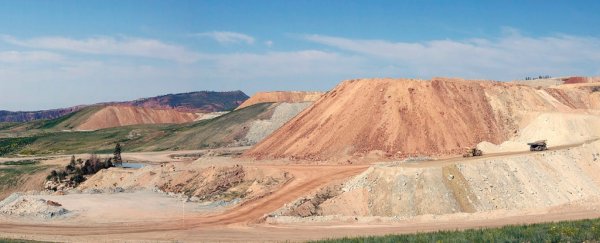The world is dealing with a lot right now. The climate is rapidly warming, the oceans are growing dangerously acidic, a sixth extinction is officially unfolding, and all the while the threat of nuclear war hangs imminent.
But there's another crisis on the horizon you might have never heard of. And if the world continues to ignore it, scientists say it could cause global catastrophe for the next generation.
Phosphorous is an essential mineral for all plants and animals on Earth, and that includes humans. A building block for DNA, this basic resource allows living cells to transfer energy, and when it's mined from phosphate ore, it can be added to fertilisers to increase agricultural production.
The problem is, phosphorous is not a renewable element, and there are currently no known substitutes and very few areas in which it is mined. As the world chews through ever greater amounts, our dwindling supply of this raw material grows ever more pressing.
A group of 40 international expert has now warned that if nothing is done to conserve this crucial element, our planet might soon run out completely. In the past 50 years alone, phosphorous fertiliser has increased five-fold, and with the human population continuing to boom, demand is expected to double by 2050.
As we race towards the brink, scientists from industries, universities and research institutes say the world is entirely unprepared for the looming phosphorous crisis.
"There is no collaboration or coordination on a global scale that takes the responsibility of governing the global P-resource, not even between EU member states or the states of USA," says ecologist Kasper Reitzel, who studies phosphorous in aquatic ecosystems and helped write the recent report.
"The EU Water Framework Directives or the American Clean Water Act focus predominantly on the ecological quality of water, and do not integrate P sustainability to a sufficient level."
At current consumption levels, some models suggest we will run out of known phosphorus reserves in 80 years. More conservative estimates place day zero 400 years from now, while others give us less than 40 years to come up with a solution to this imminent problem. Almost all the studies agree that this is an imminent issue in need of more research.
While cutting back our consumption will no doubt be key in fixing the issue, so will learning how to recycle phosphorous - and both will be especially impactful in developing countries. While the United States was once the leading phosphorous producer globally 30 years ago, India and China now account for over 45 percent of the world's total consumption.
In all that time, our practices for mining and consuming this mineral have barely improved. Today, phosphate-enriched chemical mixtures are added to nutrient-starved soil only once before they are swept out to sea. Not only does this pollute oceans and water-ways, creating dead zones where fish cannot live and poisoning drinking water, it is also unsustainable.
By putting together a closed-loop recycling system, researchers say phosphate could be reused approximately 46 times as fuel, fertiliser or food - whatever we might need.
"[O]ur current poor management of this essential nutrient represents a pressing challenge, which cause global scale pollution of water resources while failing to achieve equitable access to fertilizers to support food production worldwide," the group of international phosphorous experts write in a recent report.
"Where present, existing regulations that consider P are dated and fail to address sufficiently the wider aspects of sustainable use, or of future needs to support equitable access to resources globally," they add.
In response to years of inactions, the authors are urging industries and global authorities to develop a new generation of nutrient sustainability professionals, who can work together to "secure international phosphorus management and a clean environment" for the rest of the world.
"These people should not be simple phosphorus specialists, but rather "system thinkers" who can inform judicious decision making on all aspects of the management of phosphorus," says Reitzel.
Feeding billions of new mouths in the coming decades is going to be a huge challenge, made only more difficult when phosphorous stores begin to dwindle. There are many crucial resources we humans cannot live without, but there are few as irreplaceable as this one.
Phosphate expert Marissa de Boer recently told the Guardian the lack of public awareness makes this issue the "unknown" environmental crisis. "We really depend on phosphate but we take it for granted," she said.
It's looking like we won't be able to do so for much longer.
The findings were published in the Environmental Science & Technology.
